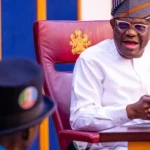...To get all news updates, Join our WhatsApp Group (Click Here)
Also Join our WhatsApp Channel (Click Here)
The National Chairman of the All Progressives Congress, Dr. Abdullahi Ganduje, has expressed confidence in the party’s ability to reclaim Kano State from the New Nigeria People’s Party, claiming that the influence of its leader, Rabiu Kwankwaso, is waning.
Speaking at the 8th and 9th APC Kano State House of Assembly Forum dinner on Monday, Ganduje, represented by Kano State APC Chairman Abdullahi Abbas, said that many of Kwankwaso’s supporters were abandoning him due to dissatisfaction with his leadership.
He said come 2027, the NNPP would not be able to repeat the 2023 electoral victory, which saw it capture Kano State.
“I always get surprised when Rabiu Kwankwaso claims he is the one who has the people. If not for our internal issues that caused some of us to leave, he wouldn’t have won any election in the state,” Ganduje stated.
He further alleged that those who once backed Kwankwaso now regret their decision. “Those who helped him are already disappointed and regretting it. I assure you that we are done with Kwankwasiyya. Even the governor is unaware of all that is happening within his administration,” he added.
Ganduje stressed the importance of unity among APC members, describing it as the key to reclaiming power.
“Unity is the only way out for us; it’s the only option we have to get what we want. God has already intervened in our situation. The current government is distorting the state, and we are just waiting for the right time. The next election will be like shifting a hen from its eggs,” he said.
The Minister of State for Housing and Urban Development, Yusuf Ata, also emphasised the need for unity and expressed confidence in the APC’s prospects. “What is left for us in Kano is just unity. If the elections were held today, we wouldn’t have any cause to be afraid. The one we didn’t win was God’s will. Let’s just pray and forge ahead in unity,” Ata said.
Criticising the current NNPP administration, Ata remarked, “We must work towards reclaiming Kano because the way the state is being handled now, we all know it’s not in good hands. Nobody is enjoying the leadership.”
Ata also commended President Bola Tinubu for prioritising Kano State in national development initiatives, including the allocation of 500 housing units, compared to 250 for other states.
The forum chairman, Abdul’azeez Gafasa, acknowledged the contributions of past APC leaders and reaffirmed the forum’s commitment to unity.
“Our leaders are working tirelessly to bring us together, and this unity will help us achieve our goals,” he said.
Efforts to get the reaction of Kano NNPP Chairman, Alhaji Hashim Dungurawa, were unsuccessful as he did not take repeated calls placed to his mobile line.
You can get every of our news as soon as they drop on WhatsApp ...To get all news updates, Join our WhatsApp Group (Click Here)
Also Join our WhatsApp Channel (Click Here)

















